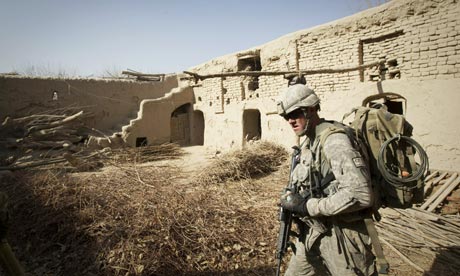-
Friday 7 January 2011 12.16 GMT
- Article history

A suicide bomber killed 17 people at a bath house in the southern Afghan town of Spin Boldak as men gathered to wash before Friday prayers, according to a provincial official. The Taliban claimed responsibility, saying their target had been the deputy of an influential border patrol commander.
Also today Nato announced that three of its troops were killed in roadside bombings, underscoring the continuing threat the Taliban pose despite a stepped-up coalition offensive.
The midday bombing killed 16 civilians and a police inspector. Spin Boldak is near the Pakistani border, about 70 miles east of the provincial capital Kandahar. Another 23 people were wounded and officials said many of them were transported to Pakistan for treatment.
A Taliban spokesman in the south, Qari Yousaf Ahmadi, said the attack targeted the second-in-command of the local border patrol. Afghan officials could not say whether he was the police inspector killed.
President Hamid Karzai, whose government has been battling the Taliban while trying to bring them to the negotiating table, called the bombing a "brutal" and un-Islamic act. "Those behind this attack should know once again that the blood of the Muslim people has been spilled. It will not have any other result."
The blast reflected the continuing instability in Afghanistan, particularly in the Taliban's traditional southern stronghold, scene of some of the fiercest fighting of a war approaching the start of its 10th year.
Nato has bolstered its forces in the south but the insurgents have been able to stand their ground there while expanding their operations to other parts of Afghanistan once considered relatively safe.
The proximity of today's attack to the Pakistani border hints at the tensions between Afghanistan and Pakistan. The Taliban leadership is believed to be based in the Pakistani city of Quetta, 60 miles east of the Afghan-Pakistan border. Afghan officials have said repeatedly that allowing the insurgents to operate from within Pakistan is a threat to both countries.
The latest Nato deaths raised to nine the number of coalition forces killed this year and marked a grim start to 2011. Last year was Nato's deadliest in Afghanistan – 702 service members were killed.
Nato has roughly 140,000 troops in the country but is struggling to quell the insurgency. Coalition officials estimate Taliban numbers at 25,000 – roughly unchanged despite the international force's stepped-up offensive against insurgent leaders and rank-and-file fighters. The US said this week it would send in an additional 1,400 combat marines.
The intensified effort is critical for Nato. Barack Obama plans to begin withdrawing troops from Afghanistan in July and Nato combat troops are scheduled to pull out of the country by 2014, handing over full security operations to the Afghan authorities.

No comments:
Post a Comment